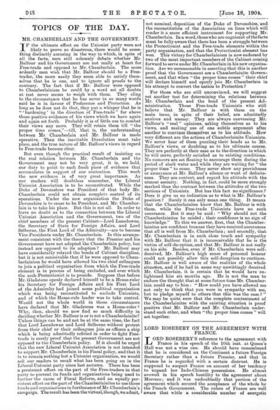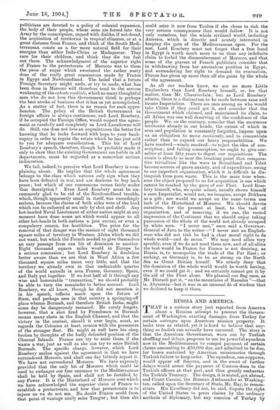LORD ROSEBERY ON THE AGREEMENT WITH FRANCE.
TORD ROSEBERY'S reference to the agreement with France in his speech of the 10th inst. at Queen's Hall was not a wise one. He should have remembered that he is considered on the Continent a future Foreign Secretary rather than a future Premier, and that in France he is regarded with a certain distrust. He is supposed to suspect France on account of her tendency to expand her Indo-Chinese possessions. He almost avowed in his speech hostility to the agreement about Morocco ; and it was undoubtedly that portion of the agreement which secured the acceptance of the whole by the French Government. The rulers of France are well aware that while a considerable number of energetic politicians are devoted to a policy of colonial expansion, the body of their people, whose sons are forced into the Army by the conscription, regard with dislike, if not dread, the acquisition of territories in tropical climates, or at a great distance from France, and think of the South Medi- terranean coasts as a far more natural field for their energies than either Indo-China or Madagascar. They care for their children, and think they die too fast out there. The acknowledgment of the superior right of France to the protectorate of Morocco was to them the piece of sugar which sweetened the rather nasty dose of the really great concessions made by France m Egypt and Newfoundland. The belief that a future Foreign Secretary might undo, or try to undo, what has been done in Morocco will therefore tend to the serious weakening of the entente cordiale, which so many thoughtful The who do not love this Government think is perhaps the best stroke of business that it has as yet accomplished. As a matter of fact, there is no reason for such appre- hension. The policy of the British Government in foreign affairs is always continuous, and Lord Rosebery, if he occupied the Foreign Office, would respect the agree- ment as carefully and completely as Lord Lansdowne will do. Still, one does not love an acquaintance the better for knowing that he looks forward with hope to your bank- ruptcy in order to regain the estate which he has just sold to you for adequate consideration. This bit of Lord Rosebery's speech, therefore, though he probably made it only to show that the existing Government arc feeble in all departments, must be regarded as a somewhat serious indiscretion.
We fail, indeed, to perceive what Lord Rosebery is com- plaining about. He implies that the whole agreement belongs to the class which nations only sign when they have been defeated in war, and are desirous to buy back peace ; but which of our concessions comes fairly under that description ? Even Lord Rosebery must be un- commonly glad to be rid of the Newfoundland trouble, which, though apparently small in itself, was exceedingly serious, because the claims of both sides were of the kind which can be enforced at sea only by shot and shell. Any hot-headed Naval Lieutenant of either nation might at any moment have done some act which would appear to all other hot-heads in both nations a just excuse, or even a compulsory reason, for hostilities. The price for the removal of that danger was the cession of eight thousand square miles of territory in Western Africa which we did not want, but which the French needed to give themselves an easy passage from one bit of dominion to another. Eight thousand square miles would in Europe be a serious concession ; but Lord Rosebery is doubtless better aware than we are that in West Africa a few thousand square miles mean very little, and that the territory we already own in that undesirable quarter of the world exceeds in area France, Germany, Spain, and Italy put together. If we lost half of it through any wise and honourable "transaction," we should probably be able to turn the remainder to better account. Lord Rosebery, we all know, though he did not mention it in his speech, reflects much upon the future of Siam, and perhaps sees in that country a springing-off place whence Burmah, and therefore British India, might some day be dangerously menaced. He surely forgets, however, that a shot fired by Frenchmen in Burmah means many shots in the English Channel, and that the victory in the contest, should it ever begin, must, as regards the Colonies at least, remain with the possessors of the stronger fleet. He might as well have his sleep broken by thoughts of the badly defended position of the Channel Islands. France can try to seize them, if she wants a wax, just as well as she can try to seize British Burmah. The specific charge, however, which Lord Rosebery makes against the agreement is that we have surrendered Monied°, and shall one day bitterly repent it.• We have not surrendered Morocco. We have expressly provided that the only bit of Morocco which could be used to endanger our free entrance to the Mediterranean shall be held by Spain, and shall not be fortified by any Power. It is the Hinterland of Morocco over which we have acknowledged the superior claim of France to establish a protectorate, and how that protectorate is to injure us we do not see. No doubt France could from that point of vantage easily seize Tangier ; but then she • could seize it now from Toulon if she chose to risk the very serious consequences that would follow. It is not only ourselves, but the whole civilised world, including America, which is directly and acutely interested in keeping the gate of the Mediterranean open. For the rest, Lord Rosebery must not forget that a free hand in Egypt is worth much more to us than any indefinite claim to forbid the dismemberment of Morocco, and that some of the gravest of French publicists consider that in withdrawing from her anomalous position in Egypt, and surrendering her right to demand its evacuation, France has given up more than all she gains by the whole of the agreement.
As all our readers know, we are no more Little Englanders than Lord Rosebery himself, or, for that matter, than Mr. Chamberlain ; but as Lord Rosebery admits, there is a distinction to be made between sane and insane Imperialism. There are men among us who would take China if they could get it, and consider that the Government which claimed, and maintained its claim, to all Africa was one well deserving of the confidence of the people. We, on the contrary, consider that the enormous territories already in our hands, the extent of which in area and. population is constantly forgotten, impose upon us an obligation to move cautiously, and to concentrate rather than to expand our heavy responsibilities. We have resolved—wisely resolved—to reject the idea of con- scription; and failing conscription, we ought to give our- selves at least fifty years to digest our acquisitions. The strain is already so near the breaking point that compara- tive trivialities like the wars in Somaliland and Tibet become sources of grave anxiety, and of expenditure, owing to our imperfect organisation, which it is difficult to dis- tinguish from pure waste. This is the more true when- ever the object proposed to us for acquisition is one which cannot be reached by the guns of our Fleet. Lord Rose- bery himself, who, we quite admit, usually shows himself a sane Imperialist, would not, we imagine, accept Bokhara as a gift; nor would we accept on the same terms one inch of the Hinterland of Morocco. We should devote ourselves, for the present at least, to the task of organisation, and of removing, if we can, the rooted impression of the Continent that we should enjoy taking possession of the whole of the world not already occupied by white men. "I never met," once said a. Governor- General of Java to the writer—" I never met an English- man who did not tink he had a• clear moral right to de whole world—and de moon." We may need allies very speedily, even if we do not need them now, and of all allies the best would be France, for France is not desiring, as Russia is, to monopolise the trade of the Far East; or seeking, as Germany is, to be as strong on the North Sea as Great Britain herself. We utterly deny that the dominion of the whole world would be worth having, even if we could get it ; and we certainly cannot get it by the aid of the Fleet alone. We planted our flag once, as Mr. Disraeli put it, "on the mountains of Rasselas "—that is, Abyssinia—but it was in an unusual fit of wisdom that we declined to keep it there.







































 Previous page
Previous page